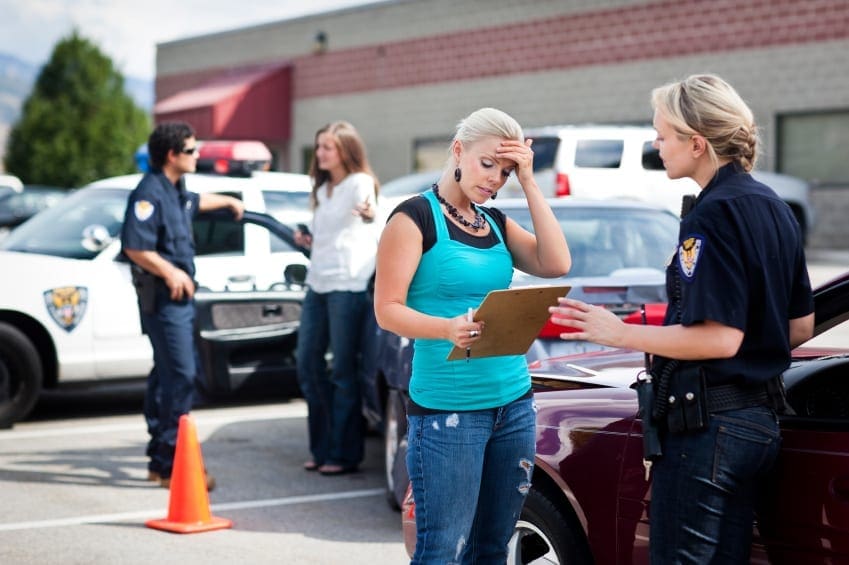There is an assortment of questions which centered around police reports and accident scenes. We’ll address reports exist, how conclusions are made, and what exactly you should take from the role of the police officer and a report as an investigator. This topic can be broken down into lots of classes; here we will concentrate on collision analysis and general reporting.
Why do police take general reports? The brutal answer is because nobody will recall the facts in just two days, much less two decades and they’ll argue it but it’s also because a third party who should be an impartial fact evaluator is needed by society. “Should” is emphasized, but we need to describe what an impartial evaluator of reality is at the context of the writing. We are currently assuming the officer / deputy has training that is sufficient to ascertain what evidence plays into the circumstance. Imagine if you went into a call for attack involving wife and a husband. Upon arrival you are told that the husband is using drugs and sexually assaulting a young child by the wife. When you question the husband he denies the claim and also has the wife’s prescription bottle in his hand — the medicine’s listed side effect is “hallucinations”. This is relevant evidence that the law enforcement officer should weigh in her or his choice.
We are also likely to assume that the officer / deputy doesn’t have any bias or stereotype towards the parties involved OR they perform however recognize it and adjust accordingly. Imagine if the officer went through a tough divorce and from above is female. Does her life have an impact on thinking the husband? What exactly does should she do about it, if it does?
Contents
Police Reports After Auto Accidents
Authorities write collision reports for the nation (in which they operate) departments of transportation. The report is designed to collect information regarding roadway design, operator error, alcohol and /or drug use, etc.. One of the concerns that are final is for the report to record for the parties, while significant.
With utilizing report templates, expertise, training, and bias may significantly impact collision reports. Why?
There are many reasons police have errors in their accounts, but by far, the main reason is lack of coaching. To be able to make a police officer, candidates attend an academy that averages some are more. Collision investigation for recruit training is less than a day’s worth of training. In this time the educator should cover everything from scene safety to general hazards to traffic patterns. In reality, unless the student after graduation and into his or her livelihood chooses to attend further training there will be refreshers no updates, upgrades, or continuations to the academy foundation.
Specialty training is imperative to understand the concepts as well as the physics behind a motor vehicle collision and these aren’t part of this basic academy curriculum. Therefore, when determining specifics of the injury it’s critical to determine the extent of training of the police officer.
To address the last point, what you ought to take away from a collision report, we will go over a true case brought to me by one of you.
A while back I was contacted by a physician, his family member had been involved in a collision where she had been rear ended by a truck in heavy traffic; double. The officer their vehicle was launched with the truck behind it in a lane of travel was told by the family member. The vehicle struck on the vehicle while in traffic. The truck driver told the investigating officer he didn’t understand where the vehicle he broke was, but he was coming onto the road through an “on ramp” and thought the vehicle tried to pass him at the shoulder and cut in front of him that is why he broke it.
The investigating officer admitted there were not any marks at the roadway to establish where the event happened but he didn’t write the report in favor of this truck driver. When I inquired about his foundation he told me and his reasoning:
“I wrote that the report in favor of the truck driver based on the damage to the vehicles although I had no formal training on harm interpretation and event correlation and couldn’t establish through signs, in which the vehicles were in the lanes of travel.” In this case the municipality who uses him would be the main problem while the gut reaction would be to blame the officer. This agency has failed to train the officer and also supply guidelines to function inside to him.
All that can be taken away from the crash itself would be the vehicle rear ended the vehicle and it likely occurred as the vehicle driver described in which the vehicle driver admitted not knowing where the vehicle was supposed to begin with.
Conclusion
So what do you remove a police crash report? Those facts that can be verified soundly proof, or by witness reasoned by them both. The police are fact gatherers, not “causality arbiters” and must be utilized as such. The caveat is that there are police specialists who have advanced training in accident reconstruction, crash dynamics and accident investigation. My training makes me to be adept in all those disciplines, but the average police officer is not and shouldn’t be considered as a person.
The scope of our information is limited to chiropractic and spinal injuries and conditions. To discuss options on the subject matter, please feel free to ask Dr. Jimenez or contact us at 915-850-0900 . �
Additional Topics: Weakened Ligaments After Whiplash
Whiplash is a commonly reported injury after an individual has been involved in an automobile accident. During an auto accident, the sheer force of the impact often causes the head and neck of the victim to jerk abruptly, back-and-forth, causing damage to the complex structures surrounding the cervical spine. Chiropractic care is a safe and effective, alternative treatment option utilized to help decrease the symptoms of whiplash.

TRENDING TOPIC: EXTRA EXTRA: New PUSH 24/7�? Fitness Center
General Disclaimer, Licenses and Board Certifications *
Professional Scope of Practice *
The information herein on "The Importance of Police Reports in Auto Accident Cases" is not intended to replace a one-on-one relationship with a qualified health care professional or licensed physician and is not medical advice. We encourage you to make healthcare decisions based on your research and partnership with a qualified healthcare professional.
Blog Information & Scope Discussions
Welcome to El Paso's Premier Wellness and Injury Care Clinic & Wellness Blog, where Dr. Alex Jimenez, DC, FNP-C, a Multi-State board-certified Family Practice Nurse Practitioner (FNP-BC) and Chiropractor (DC), presents insights on how our multidisciplinary team is dedicated to holistic healing and personalized care. Our practice aligns with evidence-based treatment protocols inspired by integrative medicine principles, similar to those on this site and on our family practice-based chiromed.com site, focusing on naturally restoring health for patients of all ages.
Our areas of multidisciplinary practice include Wellness & Nutrition, Chronic Pain, Personal Injury, Auto Accident Care, Work Injuries, Back Injury, Low Back Pain, Neck Pain, Migraine Headaches, Sports Injuries, Severe Sciatica, Scoliosis, Complex Herniated Discs, Fibromyalgia, Complex Injuries, Stress Management, Functional Medicine Treatments, and in-scope care protocols.
Our information scope is multidisciplinary, focusing on musculoskeletal and physical medicine, wellness, contributing etiological viscerosomatic disturbances within clinical presentations, associated somato-visceral reflex clinical dynamics, subluxation complexes, sensitive health issues, and functional medicine articles, topics, and discussions.
We provide and present clinical collaboration with specialists from various disciplines. Each specialist is governed by their professional scope of practice and their jurisdiction of licensure. We use functional health & wellness protocols to treat and support care for musculoskeletal injuries or disorders.
Our videos, posts, topics, and insights address clinical matters and issues that are directly or indirectly related to our clinical scope of practice.
Our office has made a reasonable effort to provide supportive citations and has identified relevant research studies that support our posts. We provide copies of supporting research studies upon request to regulatory boards and the public.
We understand that we cover matters that require an additional explanation of how they may assist in a particular care plan or treatment protocol; therefore, to discuss the subject matter above further, please feel free to ask Dr. Alex Jimenez, DC, APRN, FNP-BC, or contact us at 915-850-0900.
We are here to help you and your family.
Blessings
Dr. Alex Jimenez, DC, MSACP, APRN, FNP-BC*, CCST, IFMCP, CFMP, ATN
email: [email protected]
Multidisciplinary Licensing & Board Certifications:
Licensed as a Doctor of Chiropractic (DC) in Texas & New Mexico*
Texas DC License #: TX5807, Verified: TX5807
New Mexico DC License #: NM-DC2182, Verified: NM-DC2182
Multi-State Advanced Practice Registered Nurse (APRN*) in Texas & Multi-States
Multi-state Compact APRN License by Endorsement (42 States)
Texas APRN License #: 1191402, Verified: 1191402 *
Florida APRN License #: 11043890, Verified: APRN11043890 *
Colorado License #: C-APN.0105610-C-NP, Verified: C-APN.0105610-C-NP
New York License #: N25929, Verified N25929
License Verification Link: Nursys License Verifier
* Prescriptive Authority Authorized
ANCC FNP-BC: Board Certified Nurse Practitioner*
Compact Status: Multi-State License: Authorized to Practice in 40 States*
Graduate with Honors: ICHS: MSN-FNP (Family Nurse Practitioner Program)
Degree Granted. Master's in Family Practice MSN Diploma (Cum Laude)
Dr. Alex Jimenez, DC, APRN, FNP-BC*, CFMP, IFMCP, ATN, CCST
My Digital Business Card
Licenses and Board Certifications:
DC: Doctor of Chiropractic
APRNP: Advanced Practice Registered Nurse
FNP-BC: Family Practice Specialization (Multi-State Board Certified)
RN: Registered Nurse (Multi-State Compact License)
CFMP: Certified Functional Medicine Provider
MSN-FNP: Master of Science in Family Practice Medicine
MSACP: Master of Science in Advanced Clinical Practice
IFMCP: Institute of Functional Medicine
CCST: Certified Chiropractic Spinal Trauma
ATN: Advanced Translational Neutrogenomics
Memberships & Associations:
TCA: Texas Chiropractic Association: Member ID: 104311
AANP: American Association of Nurse Practitioners: Member ID: 2198960
ANA: American Nurse Association: Member ID: 06458222 (District TX01)
TNA: Texas Nurse Association: Member ID: 06458222
NPI: 1205907805
| Primary Taxonomy | Selected Taxonomy | State | License Number |
|---|---|---|---|
| No | 111N00000X - Chiropractor | NM | DC2182 |
| Yes | 111N00000X - Chiropractor | TX | DC5807 |
| Yes | 363LF0000X - Nurse Practitioner - Family | TX | 1191402 |
| Yes | 363LF0000X - Nurse Practitioner - Family | FL | 11043890 |
| Yes | 363LF0000X - Nurse Practitioner - Family | CO | C-APN.0105610-C-NP |
| Yes | 363LF0000X - Nurse Practitioner - Family | NY | N25929 |
Dr. Alex Jimenez, DC, APRN, FNP-BC*, CFMP, IFMCP, ATN, CCST
My Digital Business Card








